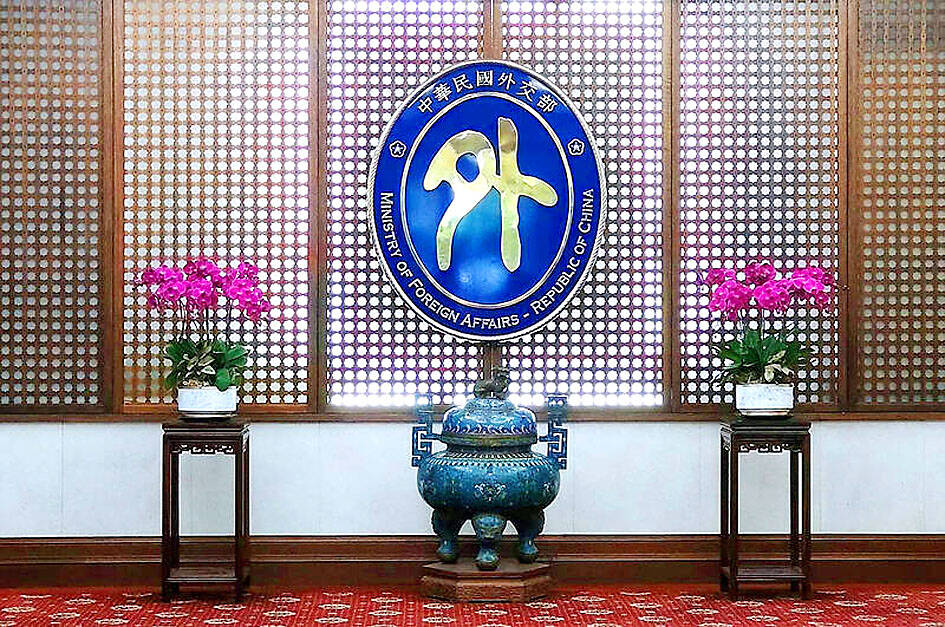The Ministry of Foreign Affairs has increased its foreign visitation budget by 61 percent to boost diplomacy next year, a source said.
The increase to NT$420 million (US$13.05 million) from NT$260 million was in response to rising commodity prices and global inflation, a source with knowledge of ministry affairs said.
The increase was justified, as the budgets for some overseas visits by Taiwanese officials had not been sufficient, the source said.

Photo: Yang Cheng-yu, Taipei Times
The source said that a target for fiscal 2025 was “continued efforts to promote mutual visits from heads of state and other high-level officials between Taiwan and friendly nations.”
Its budget for next year also includes NT$540 million for hosting foreign guests, up by NT$65.72 million from this year.
It expects to host 2,418 foreign officials next year, 896 from North America, up by 63 compared with this year, the source said.
The number of foreign officials visiting Taiwan since President William Lai (賴清德) took office has reached new heights, highlighting the nation’s integration into the global supply chain and the pan-democratic bloc, they said.
Minister of Foreign Affairs Lin Chia-lung (林佳龍) has met with many foreign officials, indicating that foreign politicians are eager to interact with Taiwan, the source said.
Increasing the funding would help Taiwan establish a more prominent international presence, the source added.
The overseas visitation budget covers the expenses of the president, vice president, presidential envoys the presidents of the five branches of government, and the heads and deputies of ministries.
Taiwan People’s Party Legislator Lin Yi-chun (林憶君) said that the ministry’s report failed to adequately explain what the increase in foreign visits would achieve, calling on the ministry to clarify the details.

Taiwanese can file complaints with the Tourism Administration to report travel agencies if their activities caused termination of a person’s citizenship, Mainland Affairs Council Minister Chiu Chui-cheng (邱垂正) said yesterday, after a podcaster highlighted a case in which a person’s citizenship was canceled for receiving a single-use Chinese passport to enter Russia. The council is aware of incidents in which people who signed up through Chinese travel agencies for tours of Russia were told they could obtain Russian visas and fast-track border clearance, Chiu told reporters on the sidelines of an event in Taipei. However, the travel agencies actually applied

New measures aimed at making Taiwan more attractive to foreign professionals came into effect this month, the National Development Council said yesterday. Among the changes, international students at Taiwanese universities would be able to work in Taiwan without a work permit in the two years after they graduate, explainer materials provided by the council said. In addition, foreign nationals who graduated from one of the world’s top 200 universities within the past five years can also apply for a two-year open work permit. Previously, those graduates would have needed to apply for a work permit using point-based criteria or have a Taiwanese company

The Shilin District Prosecutors’ Office yesterday indicted two Taiwanese and issued a wanted notice for Pete Liu (劉作虎), founder of Shenzhen-based smartphone manufacturer OnePlus Technology Co (萬普拉斯科技), for allegedly contravening the Act Governing Relations Between the People of the Taiwan Area and the Mainland Area (臺灣地區與大陸地區人民關係條例) by poaching 70 engineers in Taiwan. Liu allegedly traveled to Taiwan at the end of 2014 and met with a Taiwanese man surnamed Lin (林) to discuss establishing a mobile software research and development (R&D) team in Taiwan, prosecutors said. Without approval from the government, Lin, following Liu’s instructions, recruited more than 70 software

Chinese spouse and influencer Guan Guan’s (關關) residency permit has been revoked for repeatedly posting pro-China videos that threaten national security, the National Immigration Agency confirmed today. Guan Guan has said many controversial statements in her videos posted to Douyin (抖音), including “the red flag will soon be painted all over Taiwan” and “Taiwan is an inseparable part of China,” and expressing hope for expedited reunification. The agency last year received multiple reports alleging that Guan Guan had advocated for armed reunification. After verifying the reports, the agency last month issued a notice requiring her to appear and explain her actions. Guan